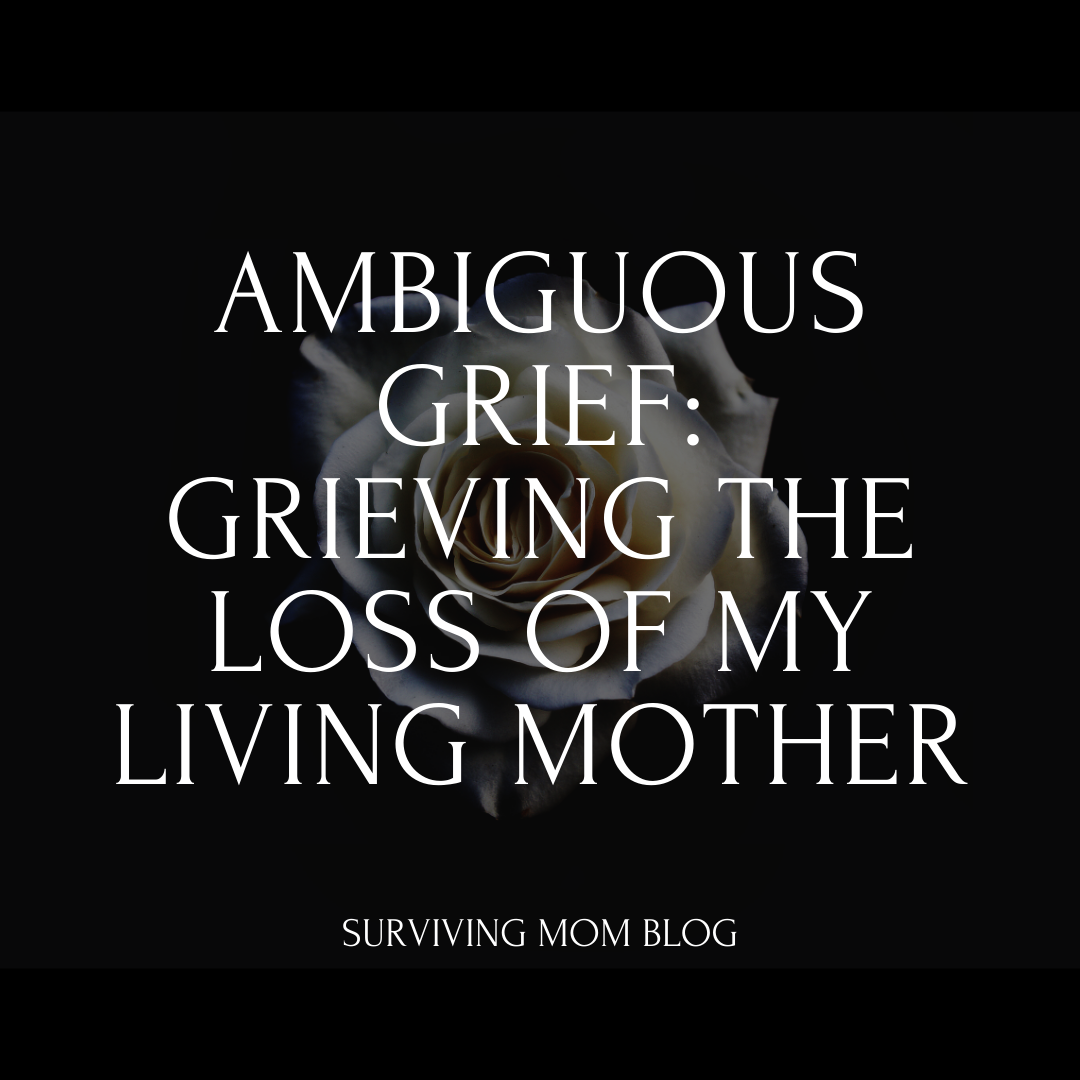
I wrote a post about grief to explain that there are many stages to the grieving process. However, this post is about the grief that I experience daily. I experience what is known as ambiguous loss. I am grieving the loss of my living mother.
AMBIGUOUS GRIEF AND LOSS
The theory of ambiguous loss was pioneered by Dr. Pauline Boss. It is used to describe a loss that is unclear and lacks closure. This takes place because the loved one is physically present but psychologically absent (for example, someone with dementia, chronic mental illness, or someone who is in active addiction) or it can be a loved one who is psychologically present but physically absent (for example, a missing person, military deployment, children leaving the home, divorce) Both types of losses are not losses in the traditional sense (Adaptedtrom Boss,P., The Contextand Process of Theory Development: The Story of Ambiguous Loss. Journal of Family Theory & Review, B, pp.269-286, 2016) .
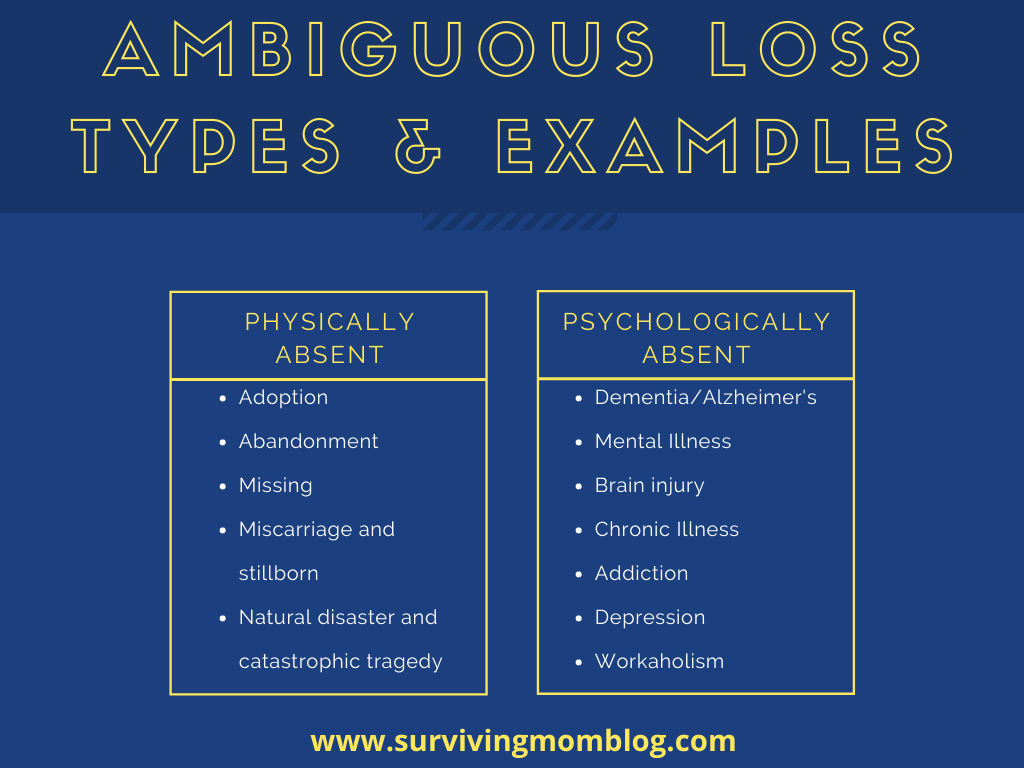
Although people who experience ambiguous grief may go through the Kubler-Ross grief stages, there may also be an added element of “hope” to it because the person is not dead. Hope can be a good thing when you are able to see the lessons you learned from your pain.
However, it can also add to your grief when you cling to false hope.
Examples of this can be hoping that a person who is an addict will become clean or that a person with dementia is going to recognize you.
I believe parents experience ambiguous loss as we adjust to the changes that come with our children getting older. We are in a sense losing the child that once was as we continue to love the person they are and will become. This unclear loss is a loss, nonetheless.
I experienced ambiguous loss/grief when my husband was drinking and taking pills. At the time, I did not realize the grief that accompanies loving someone who is an addict. In retrospect, however, I know that there is a huge sense of loss when the person that stands before you acts like a completely different person. My husband was the same physically, but he was not the man I knew. I was now married to a stranger as I gave birth to his baby and raised our child. Having to cope with that is grief in every sense of its meaning.
GRIEVING THE LOSS OF MY LIVING MOTHER
The most recent ambiguous loss that took place in my life was when I went no contact with my mother almost three years ago. My mother is alive, but she is no longer in my life. I made a decision to terminate contact with her. As a result, I am now grieving the loss of my living mother.
I explained in my prior post that I made this choice because of the childhood abuse I endured at her hands, as well as the psychological and emotional abuse that continued to take place when she would have nothing to do with me or my child as she saw fit.
Although I made this choice, I still grieve for this loss. I grieve the loss of my mother in my life. I may hate what she did to me, but I still love my mother. I simultaneously grieve the loss of my living mother while grieving the absence of the mother I never had and so desperately wanted and needed.
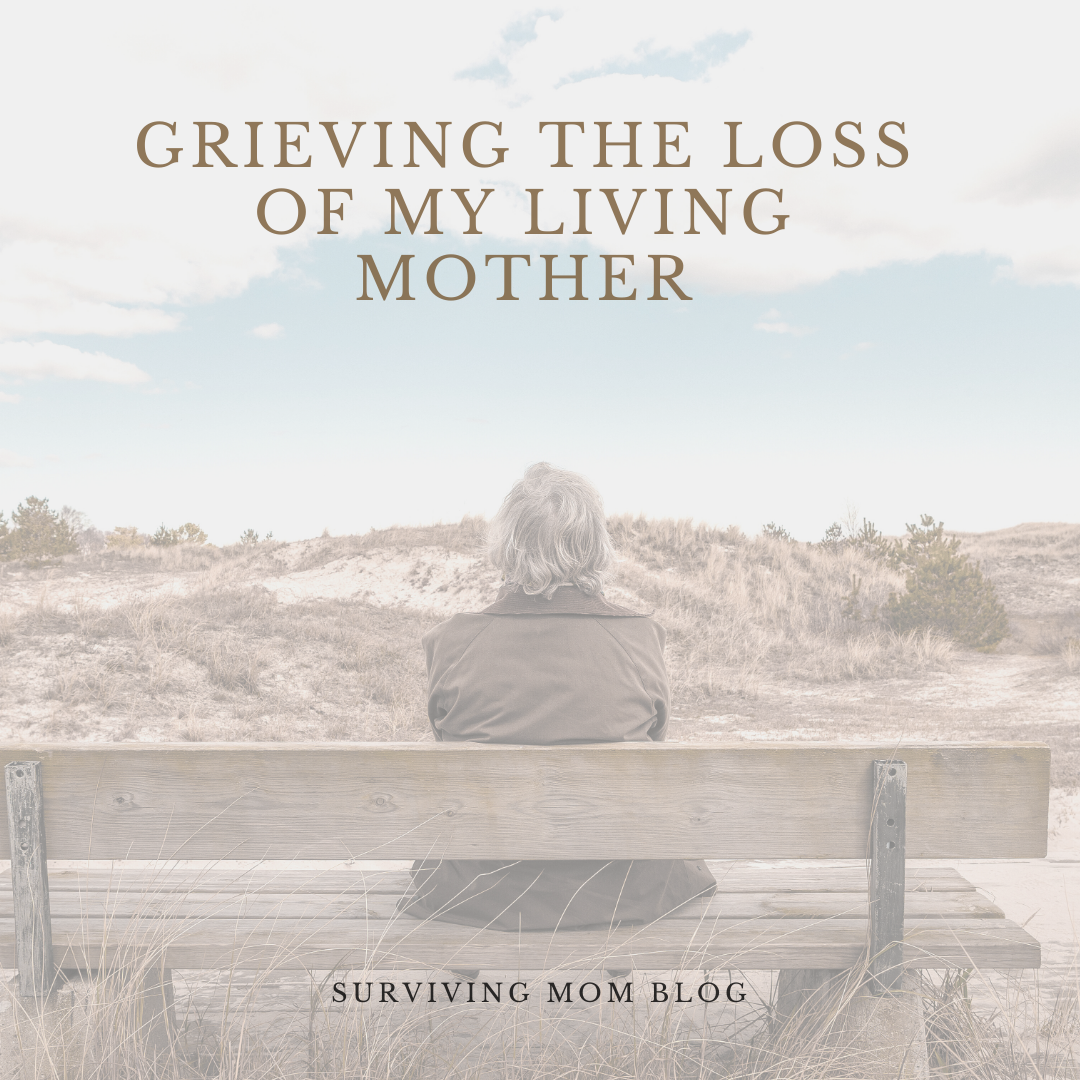
The biggest struggle I face with this type of loss is that it is harder to recognize as grief. When someone dies, there is a sense of closure, no matter how painful. It is clear that person is gone. As result, the pain and various emotions that come from this loss are recognizable and more understandable. With ambiguous loss, it is indeed ambiguous. It is harder to recognize the feelings as one of grief.
Often one isn’t sure how to process or experience a loss that isn’t concrete.
There is understanding, support, and knowledge about traditional grief. There is usually some sort of spiritual or religious belief that guides us through the death of a loved one. Jobs offer bereavement leave to give people the time they need to mourn. Mourning the death of a person is also something that is considered normal and there are support groups and/or other means of professional help.
With ambiguous loss, there is a lack of knowledge and support because there isn’t a person who died. There is not a religious or spiritual process and there is no bereavement leave due to grieving the loss of your living mother. There is a lack of support and services out there to help process this loss.
When a person’s parent dies, there is usually an outpour of sympathy and condolences. I have never received such words. There has never been any acknowledgment of the pain and loss that I feel. I have grieved alone.
People do not see my loss as a true loss because my mother is still alive.
As much as I understand the pain that comes from losing a parent, I know my grief is of a living parent. When I find out about a person’s parent dying, I want to offer my support. I want to let them know that I feel that pain too and that they are not alone. However, I usually don’t say such things out of concern that the person might find it offensive to compare my loss to theirs.
What I feel it is crucial for others to understand is that just because a person is alive, does not mean that we do not grieve deeply. I did not sever ties with my mom over something trivial. I had to walk away from the only mom I will ever have out of necessity. That does not mean that it is not painful. The conflict between my head and my heart is something I wrestle with constantly. Grieving the loss of my living mother means simultaneously knowing I did the right thing while still experiencing profound grief due to that choice. This is merely one type of inner conflict that takes place with someone who experiences ambiguous loss and grief.
MY AMBIGUOUS GRIEF WITH MY MOTHER
My mother has sent me emails since going no contact. One was to tell me she was suing me for grandparents’ visits, one was to retract that threat since she cannot do so based on the legal requirements where I live, and the rest were various forms of telling me I was responsible for keeping her granddaughter away from her. None of these emails contained any acknowledgment or responsibility for what led to my decision.
With each letter, I feel various forms of grief.
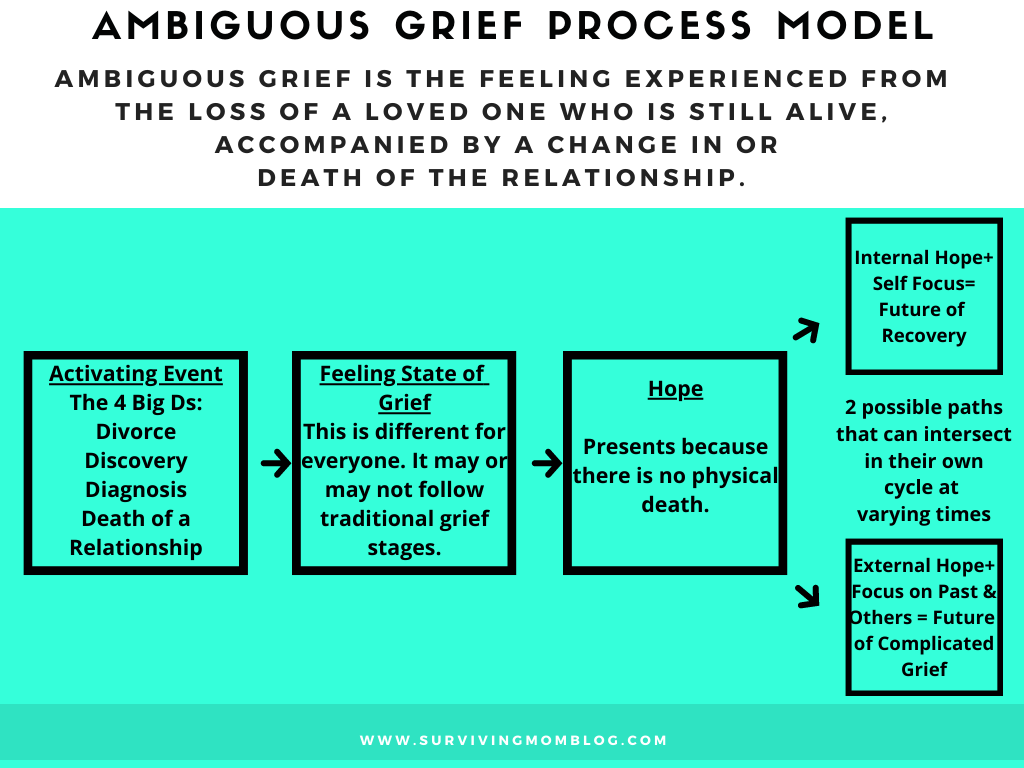
I initially feel hope that perhaps this email will be different than the others. Perhaps she will finally love me enough to want to make things right. This is the type of hope that is common and often detrimental to a person experiencing ambiguous loss. Coming to the realization that she is who she is and will never change was the hardest thing for me to accept in my life. Each letter only makes that wound of loss deeper.
After I read her letters, I feel waves of sadness and anger. I often cry and feel rage simultaneously. All of the pain comes rushing back to me. I then use every ounce of strength I possess to not respond to her email. My impulse is to explain how much it hurts me that she won’t admit that she abused me. It rips me apart that she won’t acknowledge that it isn’t okay to say that she doesn’t like me and wants nothing to do with me. I want to scream at her that I don’t understand why she doesn’t miss me enough to make things right, and why she is willing to miss out on watching her granddaughter grow up.
There are so many things I want to say, so many things I have said before, but things I know will never be understood by the woman I call my mom.
My mother is getting older, and the time will eventually come when she will leave this earth. It is then that others will say their condolences- or will they? Will I ever be seen as someone who is grieving their mother when I chose to not have her in my life while she was living?
The truth is, we all grieve. We grieve in our own ways and for our own reasons. Some types of grief are more understood than others. What I hope I have conveyed to each of you is that whatever the reason may be, grief is grief, and loss is loss. Just as we should respect and validate others’ feelings, it is important to respect and validate someone’s grief.
Loss is a void that never gets replaced. With time it becomes our new norm, but that absence is always there, and it is never forgotten. I live with that void just as much as any other person who has experienced loss. There is no competition for who grieves more or experiences loss more, but people with ambiguous loss deserve to have their grief recognized too.
I am grieving the loss of my living mom, and I kept that pain to myself for too long.
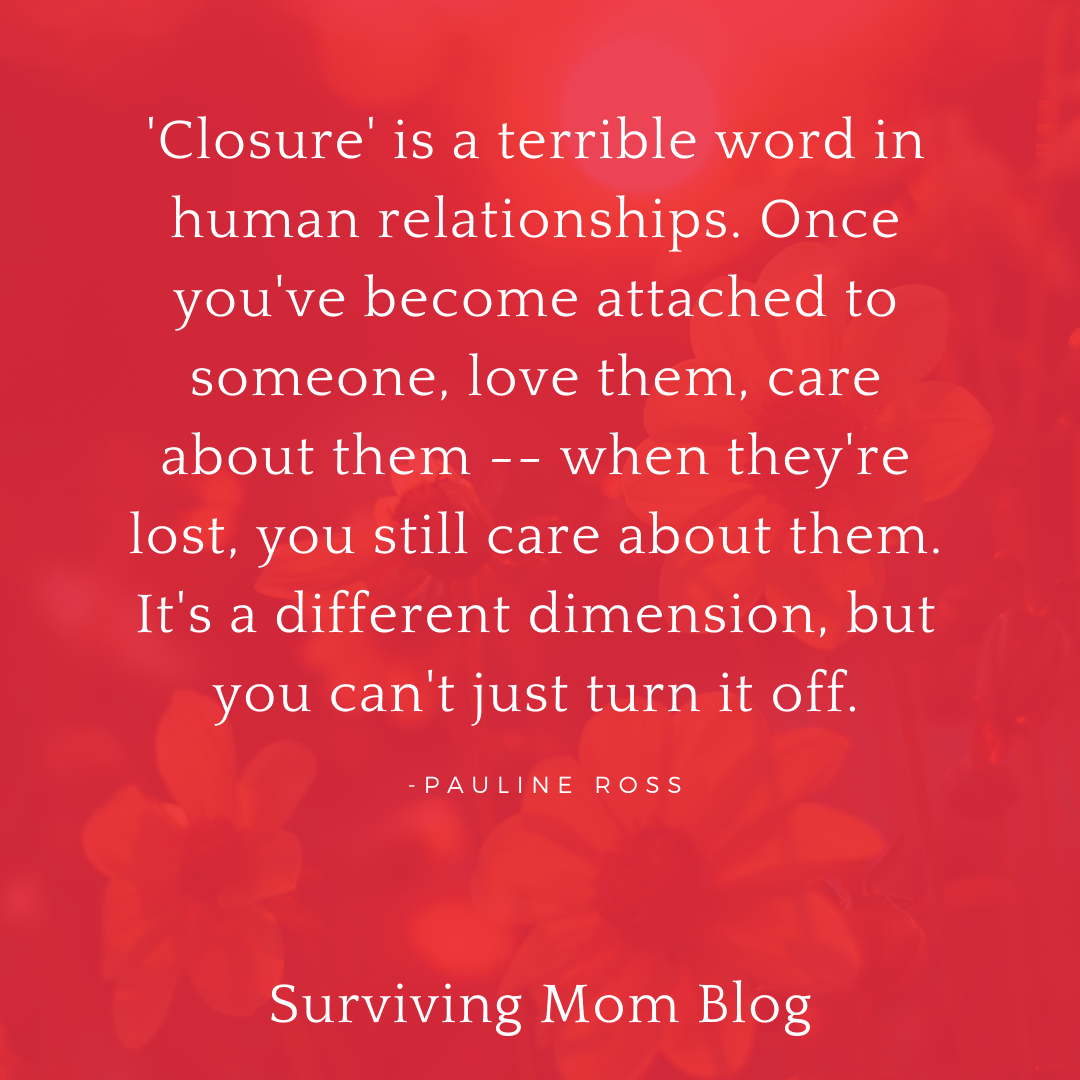
I hope my story provides support and understanding to those who are also experiencing ambiguous loss. I want you to know that your pain is real, and it deserves acknowledgment. First and foremost, you need to acknowledge it yourself. The person you love may not be dead, but you still need to grieve.
Ambiguous loss is a confusing concept, but that doesn’t mean you have to grieve alone. Reach out to friends or loved ones and explain to them how you are feeling. Do not keep your feelings to yourself, and do not allow anyone to minimize your feelings. Allow yourself to feel whatever it is you are feeling without permission or approval. I hope you show yourself compassion and understanding as you ride the waves of these emotions just as you would any traditional loss.
Disclaimer
This post may contain affiliate links. If you purchase a product via my link I may receive a small commission at no additional cost to you. Please visit our disclaimers here


Naomi P Lane says:
I have felt this kind of grief for years over a close friend who shut me out. I would cry myself to sleep at night over it for years. I felt pathetic because I couldn’t just let her go. To make it worse, she still acts all friendly on Facebook, which feels like pouring salt in the wound. I still struggle with letting go of her to this day.
Randi says:
Hi, Naomi!
Thank you for sharing about your loss, and I’m sorry that this happened to you. It makes sense to feel ambiguous grief over the death of your friendship. Your pain and way of expressing it is not at all pathetic. I completely understand how hard it is that she keeps resurfacing, as it does not allow for closure. I am sending you lots of hugs and support!
-Randi
Tonya M Freestone says:
I get that you have struggled with Ambiguous loss with your mom. I grew up with a very mentally ill birth mother. I had a stepmother who step up to raise me but it was never the same. I found out later in my adult life that I had to mourn my mother who was alive but not emotionally there. As years have passed it has changed because of her death and of her close stepmother’s death.
Randi says:
I’m sorry for what you’ve gone through with your mother and stepmother. Sending hugs to you.
Kathy Cervantes says:
Thank you for sharing your story. My mother had dementia – having her not know me – be physically angry at me was extremely difficult. However, that loss of her knowing me was nothing compared to what was to come in my life. My husband who was considered a “mans man” and not afraid of anything and loved working suffered a stroke. Physically he looks good (people say that often) – he does things around the house, but it is not the man I married. He never suffered from depression and was always my rock. Now he cries often and sleeps most of the time. The depth of my sadness is indescribable. The man who loved me, brought me little gifts, went with me on crazy adventures, and just took care of me (I’m the emotional one) – is now gone – but not gone. I never thought my heart could hurt so bad for so long. My sister passed in 2016, mom was on her dementia road since 2015 and passed in 2018, my dad (who was an angry man) passed in 2019. I was their medical representative so I did all the ER visits etc. Then my husbands stroke in 2021 – right after I retired from 32 yrs as a civil servant. I’m back to work to pay for health insurance, but the waves of grief and sadness are exhausting.
Randi says:
I am so sorry for your losses and everything you have gone through. I appreciate you sharing your story, and I’m sending you lots of hugs! Your family is lucky to have you xx